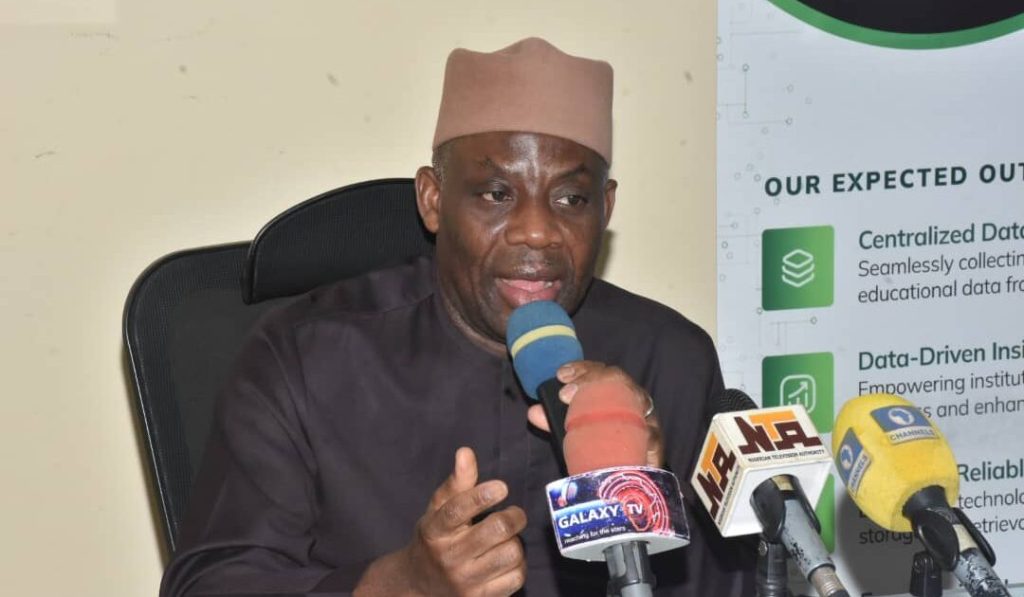Education Minister Assuages Strike Fears, Highlights Technological Advancements in Exams
Nigeria’s Minister of Education, Olatunji Alausa, has moved to quell anxieties surrounding potential disruptions to the academic calendar due to looming strike threats from the Academic Staff Union of Universities (ASUU). Alausa firmly asserted the government’s commitment to ensuring uninterrupted schooling for Nigerian children, emphasizing ongoing dialogue with ASUU and other unions. He underscored the government’s respectful approach to these negotiations, while also expressing confidence that a strike would be averted. The Minister’s pronouncements came during a Gender Inclusion Summit held in Abuja, where he also highlighted significant strides in the education sector, particularly the transition to computer-based testing (CBT) for major national examinations like WAEC and NECO. This shift, according to Alausa, is a cornerstone of the government’s strategy to curb examination malpractice and elevate the overall quality of education in Nigeria.
Alausa elaborated on the phased implementation of CBT, revealing that the November WAEC exams would utilize the technology for objective questions, with essay sections remaining paper-based for the time being. He outlined a roadmap for full CBT integration, including both objective and essay components, by the following year. The Minister championed the pedagogical benefits of CBT, arguing that it fosters deeper learning, enhances cognitive skills, and ultimately equips students to make more informed life choices. He also addressed concerns surrounding the inclusion of underserved communities and students with disabilities in the CBT framework, outlining plans to provide transportation and necessary resources to ensure equitable access to the new testing format.
Women’s Empowerment Takes Center Stage at Gender Inclusion Summit
Concurrent with the Education Minister’s pronouncements, the Gender Inclusion Summit also provided a platform for showcasing the advancements in women’s empowerment within Nigeria. Hajia Imaan Sulaiman-Ibrahim, the Minister of Women Affairs, highlighted the growing prominence of women in leadership roles, particularly within the financial sector. She revealed that women currently helm over 40% of Nigeria’s major commercial banks, exceeding global averages for female leadership representation. Sulaiman-Ibrahim emphasized the positive economic implications of gender parity in the workforce, citing a World Bank study projecting a substantial boost to Nigeria’s GDP by 2030 if the gender gap in labor force participation were closed.
The Minister further elaborated on the Families First Initiative, a government program designed to empower women, safeguard children, and provide crucial support to vulnerable families. She illustrated the program’s success with examples of concrete progress in various states, highlighting legal reforms that empower women in areas like land ownership and inheritance. Sulaiman-Ibrahim also pointed to the increased representation of women in local government positions in several states, exceeding the 35% affirmative action target. These achievements, she argued, symbolize the emergence of a new generation of female leaders poised to reshape the political and social landscape of Nigeria.
Collaborative Efforts for an Inclusive Nigeria Underscored at Summit
The Gender and Inclusion Summit, themed “New Voices and New Approaches for Accelerating an Inclusive Society,” served as a focal point for stakeholders committed to fostering a more equitable and representative Nigeria. Udeme Ufot, Chairman of the Policy Innovation Centre, stressed the critical importance of inclusivity, emphasizing the need to amplify the voices of marginalized groups, particularly rural women and youth. She argued that true inclusion necessitates actively listening to and incorporating the perspectives of those often excluded from decision-making processes.
Echoing these sentiments, Niyi Yusuf, Chairman of the Nigerian Economic Summit Group, reiterated the summit’s significance in the collective pursuit of a more inclusive Nigeria. He emphasized the timeliness of the summit’s theme, underscoring the need to move beyond traditional approaches and embrace fresh perspectives and innovative solutions to accelerate progress. Yusuf’s remarks highlighted the collective responsibility of all stakeholders in working towards a more inclusive society, recognizing the diverse contributions that all segments of the population can make to national development.
Government’s Commitment to Education and Inclusion Takes Center Stage
The concurrent discussions on education and gender equality during the summit underscored the Nigerian government’s commitment to addressing critical societal challenges. The Minister of Education’s assurances regarding the prevention of academic disruptions through dialogue with unions and the focus on technological advancements in education demonstrate a proactive approach to improving the quality of learning. Simultaneously, the Minister of Women Affairs’ highlighting of women’s empowerment initiatives and the progress made in various states showcases the government’s dedication to promoting gender equality and creating a more inclusive society.
The Gender and Inclusion Summit served as a platform for not only highlighting achievements but also for emphasizing the ongoing need for collaborative efforts and innovative approaches to address persistent challenges. The emphasis on listening to and incorporating the voices of marginalized groups underscores a crucial element of building a truly inclusive society where all citizens have an equal opportunity to thrive. The summit’s focus on both education and gender equality reflects a holistic approach to development, recognizing the interconnectedness of these issues and the importance of addressing them in tandem to achieve sustainable progress.














